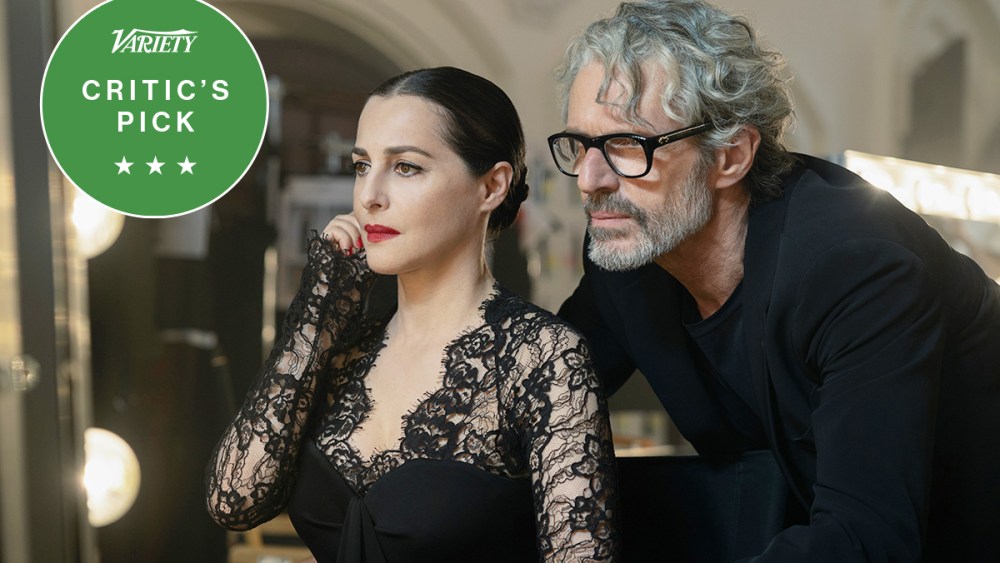Finally, a Great Fashion Drama
As a setting for a TV show, fashion is a little like the restaurant industry: a rich, untapped source of detail and conflict, hindered by the logistical complexity of bringing its insular world to the screen. And just as “The Bear” was preceded by a legion of competitive reality shows, plus a misbegotten adaptation of Anthony Bourdain’s “Kitchen Confidential” starring a young Bradley Cooper, the French drama “La Maison” is the latest of many attempts to make couture into compelling drama. “Project Runway” remains an unscripted institution, but recent scripted efforts have ranged from dutifully reverential (“Becoming Karl Lagerfeld”) to confoundingly inept (“The New Look,” which also aired on Apple TV+).
Unlike these earlier series, which fictionalized the lives of icons like Yves Saint Laurent and Coco Chanel, “La Maison” gives itself the freedom to take liberties. Perhaps relatedly, it’s by far the strongest of the recent efforts to graft fashion onto entertainment. Created and showrun by José Caltagirone and Valentine Milville and executive produced by Alex Berger (“The Bureau”), “La Maison” is frothier than its inevitable comparison to “Succession” will imply, and hardly avoids the inherent issues with communicating creative genius and massive investments on a limited budget. Yet when freed of the obligation to pay homage to bygone legends, “La Maison” can build a story around messy, bitchy, absurdly wealthy people. And rather than remain mired in the past, the show can make voraciously watchable hay of a contemporary industry in flux.
Just because “La Maison” doesn’t invoke its inspirations by name doesn’t mean they don’t exist. The titular fashion house, Ledu, is a revered global brand that’s one of the last independently owned clothiers in France. In size and structure, it’s comparable to Chanel — though its demanding designer, Vincent (Lambert Wilson), is also a member of the eponymous family, like if Lagerfeld were one of the Wertheimers. The Ledu clan’s chief rivals, the Rovels, own a luxury conglomerate that’s earned them the largest fortune in France. The Rovels stand in for the Arnaults of LVMH, the mega-company that served as the presenting sponsor of the recent Paris Olympics. (LVMH has also been parodied on “Emily in Paris” — unfortunately, the reigning title holder for TV’s biggest fashion series. I told you the situation was dire!)
Even viewers who don’t recognize these references, however, will find much to earn their attention. Vincent is caught on tape delivering a racist, John Galliano-esque tirade, plunging the house into an epochal PR crisis. His longtime muse turned second-in-command, Perle Foster (Amira Casar), hatches a radical plan to save Ledu: recruit Paloma Castel (Zita Hanrot), the daughter of Vincent’s long-dead lover, to take the reins. Paloma and her partner Ye-Ji (Park Ji-min) run an eco-conscious Berlin line that’s closer to outsider art than commerce, making her hire a major adjustment for everyone involved.
Paloma’s ascension plays out in parallel with a plot by Rovel matriarch Diane (Carole Bouquet) to vanquish Ledu once and for all. Vincent’s brother Victor (Pierre Deladonchamps) defected long ago, marrying Diane’s wallflower daughter (Florence Loiret Caille) after a sibling falling-out. (He still keeps up an extended affair with Perle, though — these people are French.) Diane, obsessed with cementing supremacy over snobs who look down on her new money, hunts for other targets who might help her acquire a majority stake. One is Vincent’s insecure nephew Robinson (Antoine Renartz), a petulant nepo baby who dreams of a line bearing his own name, not just his family’s. Robinson’s mother Marie (Anne Consigny) tends to ignore the business in favor of her vanity art foundation, but has some potential blackmail material rattling around her walk-in closet.
As Americans, it’s amusing to see titans of retail, as opposed to finance or media, depicted as a country’s symbolic elite. (“Succession’s” Roy analogy tracks better here: the Ledus own a private island and release family photos for optics, just like our favorite pseudo-Murdochs.) But that also means there’s a novelty in the tensions mined by “La Maison,” even when it reduces some characters to archetypes in doing so. Paloma is often used as a repository for every cliché about socially aware young people the writers can think of; she can barely open her mouth without mentioning waste reduction, gender equality or body positivity. Still, when was the last time TV dug into the concept of “greenwashing,” or the slow subsuming of standalone designers by international luxury groups? Or featured a cameo by Balmain’s Olivier Rousteing, treating the creative director like a celebrity? Casar’s Perle emerges as a more nuanced heroine, a woman who’s grown from passive model to active executive without the recognition to match.
“La Maison” is densely plotted yet feather-light, cramming corporate espionage and terminal diagnoses into its headlong 10-episode sprint. (Paloma seems to design, launch and manufacture her debut collection in a matter of weeks.) Its pace and levity recall “Call My Agent!” and “Drops of God,” two other French-language series to gain some traction stateside in the last few years. But in a way, “La Maison” is just making up for lost time. For a long time, a worthwhile show built around fashion has been the Hollywood equivalent of a designer’s sketch — a hypothetical lacking execution. With “La Maison,” it’s finally ready for the runway.
The first two episodes of “La Maison” are now available to stream on Apple TV+, with remaining episodes airing weekly on Fridays.


